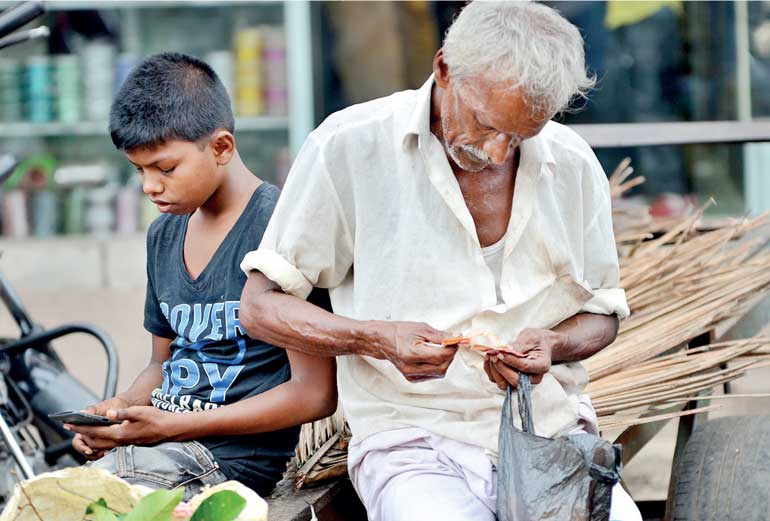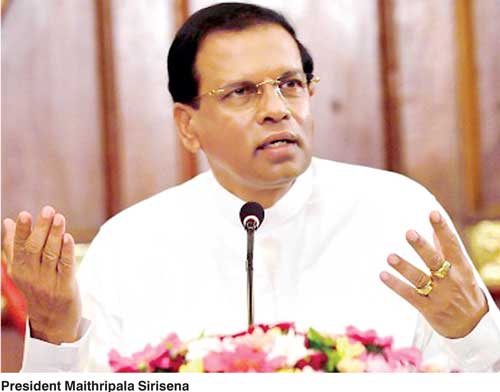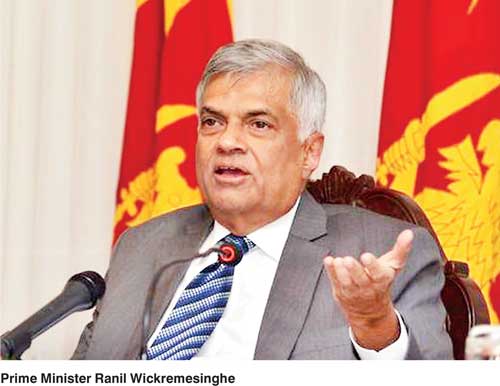Saturday Feb 21, 2026
Saturday Feb 21, 2026
Monday, 26 March 2018 00:00 - - {{hitsCtrl.values.hits}}
A slowing down economy
According to the data released by the Department of Census and Statistics or DCS – the country’s official statistics bureau – Sri Lanka’s economy has grown in 2017 by 3.1% (available at: http://www.statistics.gov.lk/national_accounts/dcsna_r2/reports/Annual_2017_(2018_03_20)_English.pdf ). This is a continuation of the deceleration of the growth rate since the new Government – till August exclusively of UNP and since then, a unity government – took charge of the economy in early 2015.

Political power enjoyed by the Government leaders in Parliament has empowered them to do what they desire. But it means nothing to citizens who only have a desire to see an improvement in their living conditions, an essential ingredient to empower them – Pic by Shehan Gunasekara
In 2014, Sri Lanka’s economy had grown by 5%, up from 3.5% in the previous year. The country under the new Government had been able to maintain the same growth rate in 2015 as well though it was not sufficient to deliver an economic miracle to Sri Lankans. In 2016, according to revised data, growth had fallen to 4.5%. In 2017, it has further fallen to 3.1%, the lowest of such growth rate recorded by the country since it had a negative economic growth in 2001.
Economic slowdown began much earlier
Economic growth began to slow down not in 2015, but in 2013. Immediately after the end of the 30-year ethnic war, the country had a short economic boom delivering an average  economic growth of about 8.5% till 2012.
economic growth of about 8.5% till 2012.
But, this growth had been attained by concentrating on the domestic economy to the exclusion of producing for a wider global market. Thus, when the domestic economy got saturated, the same high growth could not be maintained. Accordingly, the average growth rate fell to 4.2% during 2013-14.
New Government was to fix the economy
The new Government that came to power in January 2015 was expected to fix the economy’s maladies and reverse the trend. But, the growth rate continued to fall in the subsequent three-year period, making 2017 the worst year in its economic achievement in the recent past. Though the average economic growth rate during this period has been same as that of the previous two year period, the declining trend in the growth rate from 5% to 3.1% has been worrisome.
This is demonstrated specifically by the level of the average income per person, known as per capita income or PCI. When the increased prices blowing up the income is also included – known as nominal GDP – PCI has increased slightly from $ 3,842 in 2015 to $ 4,065 in 2017.
However, when the impact of the price increase on income is excluded generating real PCI, it has declined from $ 3,032 in 2015 to $ 2,780 in 2017.It is this latter set of data that have to be used if one is interested in measuring the real improvement in living conditions and well being of people. These results are disastrous.
Failure to fulfil the aspirations of a nation
Now the question before us is not what ails the economy but what ails the Unity Government. This Government, made of the majority partner United National Party or UNP and a segment of the Sri Lanka Freedom Party or SLFP plus some minority parties, had been very strong as far as the Parliamentary power is concerned. With the support of the major Tamil minority party, Tamil National Alliance or TNA, it has been able to command a two third majority on most occasions in Parliament.
Though it has been strong in commanding Parliamentary powers, it has been weak in economic management. This is perilous in terms of its avowed goal of making Sri Lanka a rich country within a generation. Political power enjoyed by the Government leaders in Parliament has empowered them to do what they desire. But it means nothing to citizens who only have a desire to see an improvement in their living conditions, an essential ingredient to empower them. That can be delivered only through rapid economic growth.
With a low and slowing economic growth during the last three years, the Government has failed to fulfil these aspirations of people. If the same trend continues in the next three years too, the Government will be branded as an economic failure.
Policy disagreement to be blamed
The blame for the economic failure should be squarely placed on the policy disagreement between the two coalition partners of the Unity Government, on the one hand, and the illogical distribution of functions within the Government making it inactive, on the other.
UNP for economic reforms
In a way, the economic ideals of the two major coalition partners are in polar opposites.
The UNP wants to introduce a ‘knowledge-based, highly-competitive social market economy policy’ in the local front. In the external front, it is free trade that will help local enterprises to produce to a market bigger than that in Sri Lanka. Hence, it is fond of having trade relations with practically all the nations.
But, trade relations have two sides, promotion of the export of goods and services on one side and the liberalisation of the import of goods and services, on the other. To produce for the rest of the world, it has to encourage investments and since local investments are in short supply, promote foreign direct investments.
Along with foreign direct investments, UNP plans to attract high technology which, at the current level of the country’s capacity, cannot be developed locally alone. But, to encourage foreign investors to come and invest, the Government has to undertake a massive liberalisation and deregulation programme.
The deregulation has to be undertaken at every level of approval needed for starting a business. They also involve handing over the loss-making State enterprises to private investors – both local and foreign. About subsidies, UNP believes that they should be targeted, limited and subject to a preannounced time-bound exit. In essence, UNP’s policy is more inclined to a private sector-based free market economy.

SLFP for a national economy
The SLFP on the other hand wants to set up a national economy with protection to domestic businesses irrespective of whether they could deliver value to citizens or not. It advocates the promotion of exports, but at the same time, frowns upon imports. Hence, its policy on trade is more inclined to the mercantilist policies which were popular in 17th to 18th centuries and have won favour with even the Trump regime in USA today.
It is a little hesitant in privatising State enterprises and believes that they could still be restructured under Government ownership. It believes that subsidies should be continued without reforms. Hence, as mentioned above, two policy ideals are polar opposites of each other. This disagreement has been a fetter tied to the ankles of the Unity Government, making it totally immovable.
Could have learned from Cameron-Clegg Government of UK
It is not unnatural for coalition governments to have parties with different economic policy ideals. But, they should be brought into coalition to work for a single policy objective. This is known as policy consensus and management.
This policy management was done effectively by David Cameron in 2010 when he formed a coalition government with Liberal Democrats who had a policy ideal different from that of the major partner, the conservatives. Liberal democrats are made up of Liberals and Social Democrats who have the same policy ideal as that of SLFP in Sri Lanka. But when the coalition was formed, they agreed on a common policy platform of introducing budgetary consolidation, austerity in spending and economic reforms.
To successfully implement this program, the Liberal Democrat leader, Nick-Clegg was appointed as the Deputy Prime Minister. In that way, policy ownership was distributed between both the Conservatives and the Liberal Democrats equally. With equal policy ownership, Liberal Democrats could not dissociate themselves with what is being proposed the Cameron Government.
Merging businesses do it wisely
In business, such policy consensus and management takes place practically every day. Imagine a merger of two companies. They come together to harness their individual strengths for the common benefit the new company being formed.
The two companies would have had two different value systems before the merger. But after being merged, they are one and they have to work for a single value system that is agreed upon. To decide this, the leaders of the two companies will go into a policy consensus and management capsule and decide on a single value system and policy after open and heart-paining debates. But after they sign off a single value system, they have to keep their previous values away and work for the newly-agreed value system.
Policy battle between the two parties
When the new Unity Government was formed in August 2015, it was just a rush job and nothing of this sort was followed. They came together only to enjoy political power and not for introducing a common economic policy programme.
If the two parties had signed off a common economic policy programme when they came into the new Unity Government, the type of open criticism and rejection of the policy being followed by the Ranil Wickremesinghe section of the Government would not have taken place. This was obvious when the Budget for 2017 was presented to Parliament by the former Minister of Finance, Ravi Karunanayake. Before it was passed at the Committee Stage in Parliament, almost all the important budget proposals had to be dropped due to the objections of the main coalition partner, SLFP.
Fate of Harsha’s policy framework unknown
An explanation given for not going through a policy dialogue is that both parties did not have such a policy framework to begin with. It has been pointed out that they only had their election manifestos and those manifestos were just short of detailed policy framework. But this is not true with respect to the UNP. As pronounced by Deputy Minister Dr. Harsha de Silva before a forum of management accountants in Colombo prior to the elections, a detailed policy framework for the next five years was being prepared under his direction by a team of leading economists of the country (available at: http://www.dailymirror.lk/76735/-90).
This writer was aware of this detailed policy framework since he was one of the members of the team. The framework was presented to Prime Minister Ranil Wickremesinghe before the election and he promptly agreed to it. When the new Unity Government was formed, the Prime Minister could have used it as the framework for policy dialogue with his new coalition partners. Yet, Harsha was packed into external affairs after the elections and with his departure, the fate of the framework prepared was not known.

Delivering policy statements without building consensus
Then, there were several policy statements delivered by Prime Minister in Parliament, one in November 2015, another in October 2016 and a third one in June 2017 in the form of a strategy for the medium term, titled Vision 2025.
They were just documents and there was no any attempt at developing policy consensus between the two partners. SLFP continued with its own ‘national economy’ ideal and economic policy was monopolised by UNP by assigning policy management part to a Cabinet Committee on Economic Management or CCEM that functioned under the chairmanship of the Prime Minister.
Had there been a Deputy Prime Minister in the Unity Government coming from SLFP as in the case of the Cameron-Clegg Government, such a monopolisation of economic policy by a single party would not have taken place. The SLFP was so angry at the arrangement that it used every opportunity to block the policies being presented by CCEM.
Finally, its patience completely wore out and it prevailed upon the President to abolish CCEM and take over the function of policy making under his control. That was the reason for setting up a new management body in the style of a National Economic Council or NEC. But, without policy consensus between the two major coalition partners, it would simply add more problems to the country’s economic policy making.
Folly of taking Central Bank and State banks away from Ministry of Finance
Even the distribution of functions among the ministries has been irrational and illogical under the new Government. The glaring mistake in this connection had been the listing of the Central Bank under the Ministry of National Policies and Economic Affairs when every relevant statute has named the Minister of Finance as the person responsible for implementing those statutes.
When this misallocation was done in January 2015, this writer immediately drew the attention of the Government that it was operationally and legally unworkable in an article in this series (available at: http://www.ft.lk/columns/listing-central-bank-under-pm-unworkable-legally-and-operationally-but-a-step-toward-banks-independe/4-384736). But nothing happened, creating an awkward situation for the Monetary Board which now had to serve two masters, one in terms of the law and another in terms of the illogical listing.
When the functions of the Government were to be gazetted again with the appointment of a new Minister of Finance in mid 2017, this writer once again drew the attention of the Government to the folly in another article in this series (available at: http://www.ft.lk/columns/asking-a-wings-clipped-finance-minister-to-fly-is-a-classic-repeat-of-dunna-dunugamuwe/4-621319). Without the Central Bank and State banks under his control, it was equated to a situation like asking a wing-clipped bird to fly. Yet, the Government continued with the folly and it is still continuing with the same.
The good, the bad and the ugly
What we see with respect to economic policies and management of UNP and SLFP is a classic case of the good, the bad and the ugly.
The UNP is good in wishful thinking of taking Sri Lanka to the future. But it is bad in selling its policy to the electorate, building policy consensus and effecting policy management. The last involves converting wishful thinking to policy, policy to plans, plans to projects and projects to implementation teams.
SLFP is good at eulogising the past but bad at forward thinking to take the country to the future in line with the changes taking place in the globe.
Both are ugly in the eyes of the citizens when they openly demonstrate their greed for power and readiness to go for overt and covert deal-making to grab that power to themselves. Citizens are now sick of this open ugly behaviour of the two major political parties of the country.
But the casualty has been the economy. It is not the politicians who hold onto power who have to bear the cost of economic failure. It is the people of the country who have to bear that burden.
(W.A. Wijewardena, a former Deputy Governor of the Central Bank of
Sri Lanka, can be reached at [email protected].)